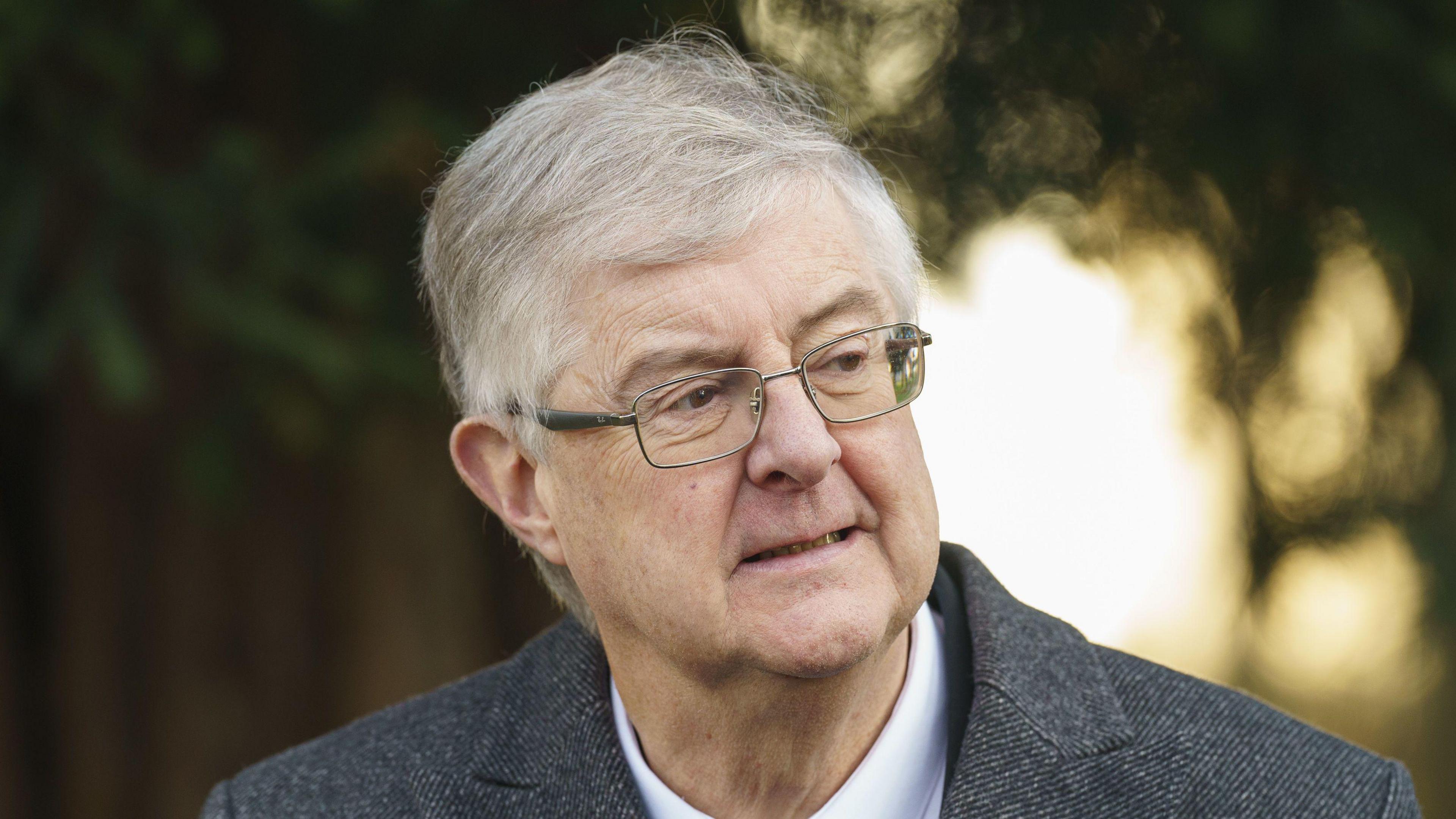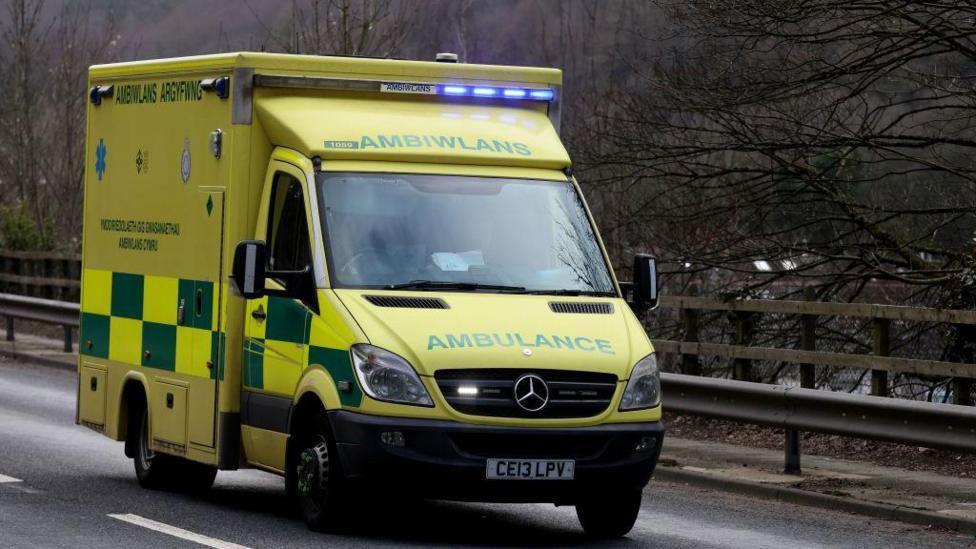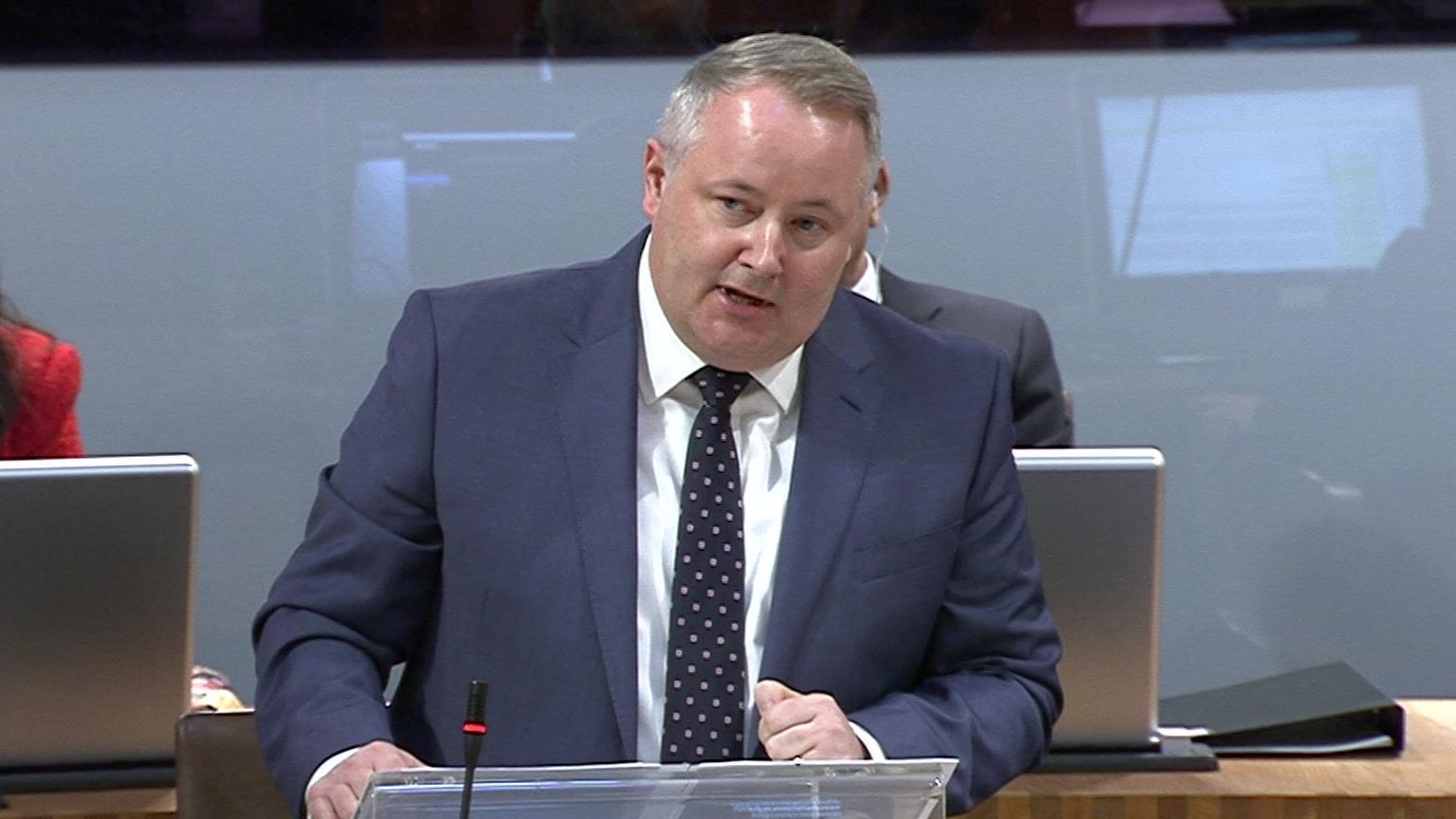NHS to get £600m Welsh budget boost to tackle waits

The Welsh government said the money would help reduce waiting times
- Published
Healthcare in Wales is being offered hundreds of millions of pounds more next year to tackle record high waiting times.
The Welsh government says there will be an extra £1.5bn to spend on public services in its £26bn budget for next April.
All departments will see an increase - with transport receiving the biggest percentage boost partly to pay for upgrading the Heads of the Valleys road.
Finance Secretary Mark Drakeford said the budget will "provide faster treatment for thousands and thousands of people in Wales".
But there are concerns over how much of the budget will have to be spent on increased National Insurance (NI) costs - with the Welsh Conservatives claiming "hundreds of millions" may go back to the Treasury.
Plaid Cymru accused the government's plans of being "underwhelming" and "unambitious".
Drakeford said Plaid faced a "day of reckoning" over whether it would vote against the budget.
The Welsh government will need the support of an opposition politician in the Senedd to pass the budget. It is likely it will have to strike a deal with Lib Dem Jane Dodds, who wants to see more childcare support.
Concerns were raised about cash for the arts, with a union saying an increase of £1m for the Arts Council of Wales was "derisory".
Back budget or Wales could lose £1bn, FM warns
- Published3 December 2024
Welsh FM invites Plaid to help pass budget
- Published19 November 2024
Plaid wants HS2 cash before helping Labour budget
- Published12 October 2024
Most of the extra cash is going to the NHS, with £437m more for day-to-day spending.
There is also an extra £175m to maintain NHS buildings and equipment.
Tuesday's budget is a contrast to the last set of spending plans which imposed cuts to all departments except health.
Drakeford, the former first minister, said it would take time "to reverse the damage inflicted on Wales over 14 long years of neglect from previous UK administrations".
In the Senedd he added the budget increases spending "most of all" on the 20% of the population "that has the least".
He described it as a budget for "growth" and "hope": "It is a budget which reminds people in Wales time after time after time, they have put their faith in a Labour government."
Most of the funding comes from the UK government, which gave the Welsh government a cash boost when Chancellor Rachel Reeves announced her budget in October.
But it is not clear how much money will be swallowed by the higher NI payments for employers that she introduced.
Welsh officials expect extra funding to cover the cost for public sector employers, but not for the private companies and the voluntary sector that provide many services, including businesses running care homes.
Sanjiv Joshi, chairman of the Caron Group of care homes, said the business faced rising wage costs and higher national insurance contributions.
Without additional funding "a lot of our homes will struggle to meet those [costs] and it could actually lead to some home closures".
The WCVA, which represents Welsh charities and the voluntary sector, said it was "deeply concerned" the budget made no reference to measures aimed to mitigate increased insurance contributions and the national living wage on voluntary organisations.

Mark Drakeford said the budget was a "real opportunity" to "reinvigorate public services"
Tough decisions ahead
There is no change to income tax rates in Wales, meaning they will remain the same as in England.
The rates of land transaction tax paid by people buying homes will also remain the same, unless they already own one or more property. Those people pay a higher rate which is going up by one percentage point.
Despite a steep increase in funding this year, the budget confirms "the outlook for public finances beyond (2026) looks challenging".
Finance experts at Cardiff University have warned that could mean more tough decisions for public services after next year.
The budget covering the day-to-day running costs of the NHS will grow by about 3.9% next year, rising to almost £11.4bn.
Reducing the longest waits for treatment is a priority, Labour says.
The most recent data show that by September 23,701 waits for treatment had lasted more than two years. The equivalent figure in England is 113.
Rising demand for healthcare means the NHS will still have to find savings and become more efficient, the budget said.
The Welsh NHS Confederation, which represents health service bodies, welcomed the extra cash but said more needed to be done in social care.
The body said: "The NHS and social care are intrinsically linked, so unless we improve all parts of the system, no one part can expect to sufficiently progress."

The NHS will see an extra £467m in day-to-day funding
Other headline figures say that:
Housing and local government, which includes social care and schools, will receive an additional £279.9m (5.4%) and £120m more in capital
Transport will get an additional £69.6m (12%), and £51m extra in capital funding
Education will receive £83.6m (4.9%), and £28m more in capital funding (8.1%)
Climate change and rural affairs will receive an additional £36.35m (6.6%) and £71.95m in more capital (31%)
Social justice will receive an additional £6.8m revenue findings (4.7%) and £3m for capital funding
Councils will get an extra £235m - up by 4.3% - while an extra £20m is being spent on the Welsh government's childcare offer.
More than £30m a year for A465
Transport's boost includes charges that the Welsh government will have to pay for the A465 Heads of the Valleys Road.
The scheme is privately financed and the Welsh government will have to pay an annual fee once it is completed - costing £31.7m in 2025/26 and rising to £36m in 2026/27.
A total of £25m will be spent on repair potholes on A roads, with a separate £5m fund to help council borrow cash to fix local roads.
Arts and culture bodies and Sport Wales saw a 10% cut this year. They will get an increase of £4.5m from April, but it will not make up for previous cuts.
Equity, the acting union, said an extra £1m for Arts Council Wales was "derisory" and "in no way makes up for cuts of previous years".
An extra £12m is earmarked for coal tip safety, on top of £25m secured from Westminster.
Support for bus services will increase by £9.1m. Bus lobbying group CPT Cymru welcomed the cash but said "with costs rising fast, this money may not be sufficient to sustain existing routes and services, let alone grow them".
Drakeford told the Senedd that business rate relief for retailers and hospitality, which began during Covid, will be maintained for a "sixth and final year".
The scheme was cut back from 75% to 40% relief earlier this year.
'Smoke and mirrors' say Tories
In the Senedd on Tuesday, newly appointed Welsh Conservative Senedd leader Darren Millar asked the first minister how much of the budget will be "gobbled up" to cover National Insurance increases.
"The truth is, as you well know, that hundreds of millions of pounds that you say is extra money coming to Wales will simply go straight back down the M4 into the coffers of the Treasury," he said.
Millar said it was a "smoke and mirrors situation and that gives with one hand and takes away with the other".
First Minister Eluned Morgan said those who are directly employed by the public sector would be "covered" for national insurance.
She added it was the "highest budget uplift since the beginning of devolution".

Darren Millar warned the budget could be gobbled up by national insurances rises
How will the budget pass?
The Welsh government will need an opposition politician to help pass its plans in the Senedd, with a final vote planned in March 2025.
It is looking likely the government will have to do a deal with Jane Dodds, the only Welsh Liberal Democrat in the Senedd.
In an interview with Radio Cymru, Dodds did not rule out her involvement.
"It's important that we get the budget through and we get the money in full," she said. "I'm open to speaking to them but I don't know what will happen yet."
She later said the draft budget was a "missed opportunity" which had failed to deliver on childcare.
Dodds said an extra £20m would only "paper over the cracks". Despite her criticism, it is understood that talks remain ongoing with the Lib Dem.
A Plaid Cymru politician appeared to rule out a deal on budget on Tuesday morning.
The party's finance spokesperson Heledd Fychan, asked if she was up for a budget deal on Radio Wales Breakfast, said "No. We want fair funding for Wales."
Later, she added: "Labour's budget is underwhelming, unambitious, and falls woefully short of what's needed to support Wales' struggling public services."
In the Senedd, Drakeford said Plaid Cymru faced a "day of reckoning" over whether to vote against the budget.
He said he was open to discussing the spending plans with Plaid but if the party was not interested "the people of Wales will see through you and the political games you think you can play with their futures".
In response, Plaid leader Rhun ap Iorwerth said: "This is Labour's budget to pass. They will have to reflect on whether shouting at us in the chamber is the way to achieve that."
Extra cash for social housing
A funding increase to build more council and housing association homes has been promised after doubts were raised about a key commitment.
Welsh Labour's manifesto promised to create 20,000 social homes for rent by 2026.
But the spending watchdog said in September fewer than half had been built and significantly more money was needed hit the target.
The government said an extra £81m in the budget would help reduce homelessness and "ensure everyone in Wales has a place to call home".
The Chartered Institute of Housing Cymru welcomed the investment but said the total level of investment - £437m - was below the £580m to £740m needed to reach the 20,000 target.
Analysis by Daniel Davies, BBC Wales political correspondent
Labour hopes voters will snap up this two-for-one budget.
It is desperate to prove Wales is better off with two Labour governments.
In Cardiff, Mark Drakeford has more to spend because his colleague Rachel Reeves has loosened the purse strings in Westminster.
But instead of splurging on a Christmas shopping spree, he's trying to deliver long-standing commitments, including building more social housing and cutting waiting times.
This budget covers the financial year up to the next Senedd election in 2026, when voters can deliver their verdict on whether it is money well spent.
What is the Welsh budget?
The Welsh government publishes a budget every year which explains how it will fund public services it controls.
It covers the health service, education, councils, and rural matters, among other departments.
It includes some tax decisions but most levies are decided in Westminster.
What does it mean for the health service?
By Owain Clarke, BBC Wales health correspondent
Prioritising the health service, once again in this budget, is not a surprising choice - especially for politicians who'll soon face an election.
Health is a top issue for voters and the problems of the health service are plain to see.
Waiting lists in Wales are at record levels and growing, A&Es and the ambulance service are braced for another difficult winter.
The costs of medicines continue to rise and the maintenance backlog cost for NHS buildings is estimated to be more than £750m.
Meanwhile Welsh health boards project their combined deficits will be around £221m at the end of this financial year - so the extra cash could be swallowed up very quickly.
But there are other risks in prioritising spending on health above other Welsh government departments - many of which have faced substantial cuts in recent budgets.
Experts warn if not enough money is spent on services like housing, leisure, and early years support for children - which help people live healthier lives in the first place - it could lead to even more pressure on the health service down the line.
And that's a concern considering health and care now consumes around 56% of the Welsh government's day to day spending budget - much higher than 36% at the start of devolution 25 years ago.